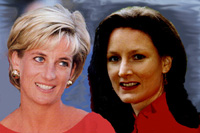Princess Thelma meets Queen Louise
Thirty-eight years ago when I left the Immanuel Deaconess Institute orphanage, I left behind a long-lost sister whose identity I never knew. Today, thanks to People magazine, I have found my sister. I should have known sooner. I've seen her photo a thousand times. Our noses should have been a dead give-away, and except for a few minor details, our lives have traversed parallel paths. We were both bashful, isolated, oversensitive children. We were both tall, dorky looking teen-agers. We were both married at a young age to older men. She married Chuck, Prince of Wales. I married Spike, King of the Road. Both became Dick, Maker of Mommy-wives. My long-lost sister and I countered our husbands' machinations with uncanny similarity. We cried, pouted, stormed off, sulked, fumed, whined, manipulated, pleaded, cut deals, rebelled, repented, then behaved ourselves just long enough to build up the strength to do it again. Still, I didn't recognize her. Even when we left Spike and Chuck around the same time, and even though we both fell to pieces over leaving them because we were so scared to death to be alone, I still didn't figure out who she was. Not even her 1940s, thrift-plus-couture, kind-of-California with a flying-saucer-for-a-hat sense of style gave her away. No, it took the latest batch of headlines to awaken me to the identity of my long-lost sister. "The Diana We Never Knew," hailed the bastion of personality assessment known as People magazine. "Two years after the princess's death, a new book details her chaotic last year, a secret romance gone very wrong and the emotional tailspin that led to her tragic affair with Dodi." The New York Post shortened it to: "How sick was she?" This newest round of articles was unleashed by yet another parasitic publishing cabal looking to squeeze a few more bucks out of Dianamania, of which I would have been more than happy to be a part had I the chance. After all, the resulting book will sell millions and bring the author fortune and fame and more book contracts about other famous people who are in reality pathatically and therefore gloriously human. The book excerpt in People - which I am guilty of buying and thereby of perpetuating the parasitic publishing cycle - described Diana as "self-destructive, easily depressed, panicky and volatile...but on the surface, charming, insightful, witty and lively." "Hmm," I thought. "Were I to write an honest personal ad...." It was undeniable. How many of us with long, aqualine noses and ex-husbands with one-syllable reverse allitertive names could also be self-destructive, easily depressed, panicky and volatile yet charming, insightful, witty and lively? No, it simply had to be. Diana, dead Princess of Wales, was my sister. Even the author's undoubtedly qualified diagnosis of Diana's behavior as a mental illness struck a chord, especially since the woman never actually met Diana but interviewed friends and "associates." I can't count the number of my friends and associates who'd describe me as crazy, and consider it complement. Coincidence? I thought not. The excerpt in People ends with a condescending lament about Diana never really knowing herself, but I don't buy it. I think she was just about to shake off the whole dynastic umbrage and have some fun. Had things been just a little different, we'd probably be driving up to the Monterrey Jazz Festival on Highway 1 in a red convertible, flipping our skirts at truck drivers and laughing at what the world still has to say about women who don't behave like they should. Monday, August 23, 1999
Copyright 2010 by Deborah McAdams. All Rights Reserved. For Reprint Rights, click here.
|
